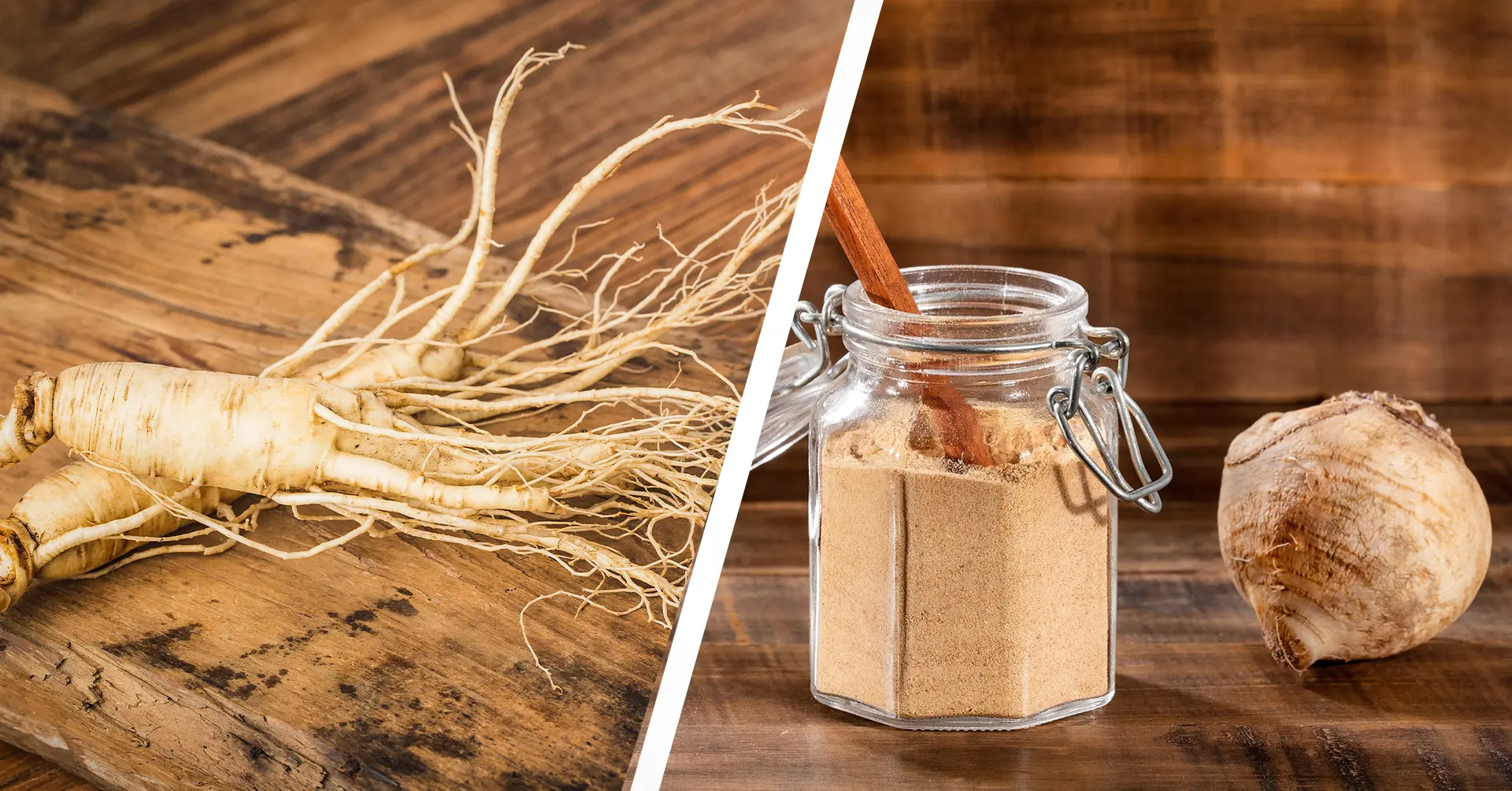Maca is a Peruvian root vegetable. It has been used for centuries to treat poor energy, hormone imbalances, and libido. Ginseng has long been part of the Asian ecology. It has long been used in traditional Chinese medicine to boost mental and physical health. These natural remedies have merits, but which would assist you most? In this article, we compare maca vs. ginseng, looking at its advantages, nutritional composition, and other factors.
Maca vs. Ginseng: Key Differences
Ginseng vs. maca are adaptogens, although they vary:
- Though ginseng is primarily connected with Asia, maca, and ginseng are from Peru.
- Maca root is used most, followed by ginseng root and leaf.
- Maca tastes earthy-nutty, but ginseng taste is astringent.
- The benefits of ginseng may take two months, whereas maca may take two weeks.
- Ginseng does not impact hormone levels, while maca helps maintain hormonal balance.
- Maca is a superfood since it contains vitamins, minerals, protein, and fiber. Its nutrients are varied. The scientific community does not consider ginseng a superfood.
What is maca?
Maca powder comes from the dried roots of the Andean plant Lepidium meyenii. These mountains are high. Many civilizations have used it as a dietary supplement for ages; some drink it like coffee.
Maca is rich in phytochemicals, antioxidants, vitamins, minerals, fatty acids, and amino acids. Maca improves mental and physical health, although it’s mostly used to boost stamina and immunity.
Peruvian Andean indigenous people initially cultivated and used this root. Peruvians have known for years that maca is a powerful adaptogen and superfood with many health benefits, but the rest of the world is only learning.
How to use Maca?
South American root vegetable maca has been used medicinally for generations. Some maca-containing sentence structures:
- Add maca powder to your smoothie for vitality.
- Maca root is known for its hormonal balancing benefits.
- Some people think maca boosts fertility.
This term applies to the raw root vegetable and “maca powder,” crushed up form. Indeed, this is the case. It’s often discussed in health and wellness, especially vitality, hormones, and reproduction.
Nutritional Value
- Maca roots include glucosinolates, polyphenols, carbs, proteins, fibers, minerals including copper and iron, vitamin C, lipids, and more. Maca is a South American root.
- The macronutrient breakdown of 100 grams of dried maca roots is 59% carbs, 10.2% protein, 8.5% fiber, and 2.2% fat. It contains around 325 calories.
- Active marker chemicals in maca are macamides, macaenes, and benzylated alkamides. Traditional Chinese medicine employed maca. Different root species have different macamides and macaenes, which give them different hues.
Benefits
-
Erectile Dysfunction Help
Research suggests maca root may improve reproductive health and reduce erectile dysfunction. This study encouraged participants to consume 2.4 grams of maca root daily for 12 weeks to enhance their general health.
Men in the experiment had minor ED symptoms. The findings revealed that maca root improved physical health more than a placebo.
-
Boost your mood and reduce stress
Maca’s antioxidant flavonoids boost happiness and reduce anxiety. Maca may reduce sad and anxiety symptoms, according to a 14-postmenopausal study. A different research examined how maca helps Chinese postmenopausal women with depression.
-
Learning Improvement
There is evidence that maca may improve memory and cognition. In 2011, researchers found that maca improved lab mouse memory. Another study suggests maca may boost memory and recollection. It may prevent and cure Alzheimer’s and other memory-loss diseases.
-
Encourage Skin Health
Maca roots may promote skin health due to their antioxidant content. It may protect the skin from UV radiation and promote wound healing.
What is Ginseng?
Panax ginseng, an adaptogenic plant, has long been used in traditional Chinese medicine. Asian and American ginseng are popular.
American and Asian ginseng have different active ingredient concentrations and effects. Asian ginseng stimulates, whereas American ginseng calms, according to decades-old studies. Ginsenoside and gintonin are two of the most bioactive components of ginseng. Ginseng’s benefits may come from these substances.
Ginseng comes from Asia and North America. Traditional medicine has used it for thousands of years because of its patient advantages. Here are some ginseng uses:
- Ginseng is usually drunk as tea.
- Many researchers suggest ginseng may boost mental functioning.
- Ginseng has long been used in traditional Chinese medicine.
- “ginseng” may refer to the plant or its products, such as tea and supplements. Mental health and illness prevention are common uses for conventional and alternative treatments.
Nutrient Value
- Taking 0.5 to 2.0 grams of ginseng won’t add calories or fat to your diet. It includes physiologically active phytochemicals, antioxidants, minerals, and vitamins.
- Ginseng’s main active components are triterpene glycosides or ginsenosides. Ginseng is rich in protopanaxadiol (PPD) and protopanaxatriol (PPT).
- Ginseng contains polyacetylene and phenolic chemicals like maltol, among others. According to research, Ginseng’s principal phenolic antioxidants include salicylic acid, vanillic acid, gentisicacids, and p-coumaric acid.
Benefits
Get More Energy
Ginseng is known to reduce fatigue and increase energy. Animal studies show that ginseng contains bioactive polysaccharides and oligopeptides that reduce oxidative stress. These chemicals also boost energy and reduce weariness.
Reduce inflammation
Ginseng may reduce edema, according to a study. Most ginseng, termed ginsenosides, targets immune system pathways that may reduce inflammation.
Control Blood Sugar
Multiple studies have shown that American ginseng may assist type 2 diabetics in regulating their blood sugar, relieving some of the disease’s most irritating symptoms. Studies show that taking Panax ginseng an hour after ingesting glucose reduces blood glucose, confirming the glucoregulatory theory.
Boosts Immunity
According to research, ginseng may help the body fight sickness by boosting the immune system. Much study has been done on this benefit. The plant decreases inflammation, fights infections, and boosts immunity.
Decrease Cancer
A recent study reveals that ginseng’s ability to decrease cancer cell growth makes it an effective anticancer drug. Increased T and NK cell immunity, apoptosis, angiogenesis restriction, and oxidative stress protection are the herb’s anticancer effects.
These results imply a relationship between the herb’s anticancer qualities and these negative effects, but additional research is needed. Research shows that anti-inflammatory, antioxidant, and apoptotic gene expression actions of ginseng may prevent cancer.
Side Effects
- The people like maca root as a nutritious meal. Participants who ingested 3 grams of maca roots daily for 12 weeks had no adverse reactions.
- Pregnant and breastfeeding women should avoid it.
- Ginseng is safe since it has no known side effects. It may affect anticoagulants and hypoglycemics. Before taking ginseng, see your doctor.
Ginseng vs Maca: Which is best?
- Ginseng is the finest stimulating adaptogen for stress reduction and productivity. It improves blood flow and cardiovascular health, boosting sexual function.
- Though these are secondary benefits, ginseng may reduce inflammation and assist in weight reduction.
- Sexual performance and virility are maca root’s main benefits. It may boost energy and endurance.
- Have little energy yet want to improve your libido? Try maca. The vitamins in it restore your body’s normal functioning.
Avoiding Common Mistakes
Maca and ginseng are sometimes used interchangeably, although there are several misconceptions. Such mistakes should be avoided at all costs due to their ineffectual or hazardous effects. Avoid common mistakes by not doing these:
Assuming They Both Benefit
One of the biggest myths is that maca and ginseng are equally healthy. Both adaptogens may aid with energy and stress management, but their effects on the body may vary owing to their distinct properties.
Maca helps regulate hormones and enhance fertility, while ginseng boosts cognition and immunity. Fertility-boosting maca has been extensively explored. Knowing each herb’s advantages is crucial before mixing them.
Ignoring Dosage and Presentation
Maca vs. Ginseng dose and diversity are often overlooked. The suggested dose for these plants depends on the administration type (powder, tablet, extract).
Before using these herbs, visit a doctor and observe the recommendations. If you have health conditions or use drugs, this is crucial. In excessive doses, these plants may induce gastrointestinal upset, headaches, and sleeplessness.
Using them all without being told
When adding maca vs. ginseng to a routine, it’s common to overlook the dose and variety of the herb. Avoid mixing these plants if you use prescriptions or have a medical history. Before combining these herbs, see a doctor and follow the dose and preparation instructions.
Unreliable Suppliers
Finally, buying maca and ginseng from unreliable sources may lead to poor results and health hazards. Always purchase from trusted companies that employ safe production and high-quality ingredients for optimum outcomes.
Conclusion
Maca vs. Ginseng comparison reveals that each herb has particular advantages and applications. Maca boosts energy and fertility. However, ginseng may improve cognition and stress.
Despite their lengthy usage history in traditional medicine and rigorous investigation, these plants’ physiological effects deserve additional study. Important factor. Before using any new supplements, see a doctor.
Also Read:
Balance Personal and Study Time : Tips To Follow






